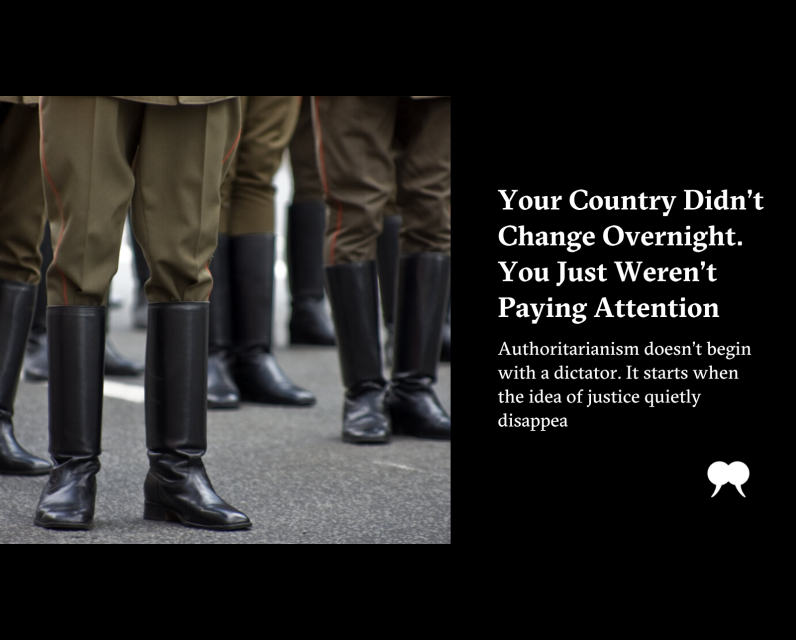Your Country Didn’t Change Overnight. You Just Weren’t Paying Attention

“T his is not my country!”
So shouted a woman in the United States in the last days of June 2018. She was voicing the sentiments of many while speaking to a reporter about how cruel it was to separate children from their immigrant parents as part of Donald Trump’s border policy. Thousands of people across several cities rejected being part of an America where immigrant toddlers were expected to appear in court alone. A five-year-old was crawling on the table in a courtroom, and a girl too young to know which country she was from was trying to draw it with crayons for her lawyer. Movie star Susan Sarandon was in police custody with another 500 people for occupying a state office in protest against the ridiculous cruelty, and Trump supporters were trashing her for being an “attention whore.” It was their country now.
What is a country? While searching for an answer to this question, I recalled the great Theo Angelopoulos movie. “What is tomorrow?” the film asked, and the answer was the title, Eternity and a Day. A country, I thought, is in fact a vast land and a table. It is a table surrounded by loved ones to whom you don’t have to explain your jokes, and the vast land that surrounds it, which is mostly your imagination.
It was 2011 when I wrote this, on a day that I still remember vividly. I was standing at a gate in Tunis airport after talking to my lawyer, who had said, “They’re arresting journalists by the dozen today. Take a vacation or something. I don’t know, go away somewhere.”
I looked at the passengers boarding the plane to Istanbul, then down at my boarding pass. While trying to change my ticket from home to somewhere else, it was the first time I felt that Turkey was hardly my country. My country was actually a table, not the vast land that surrounded it. A table that I owned. The land around it had disowned me—or at least it convinced me that it had at the time.
To Americans afraid of what is happening to their country, I want to say: The vast land you thought you belonged to does not shrink down to a table overnight. It takes years. You may assume that the cause of this shrinking is oppression and the fear it generates. But in fact it does not begin at the moment a clown takes over the presidency or a psychotic emperor starts barking orders at the nation from his palace. It does not start when biased laws are enforced against dissidents as if they’re prisoners of war, or when being punished by the law ceases to feel like the understandable consequence of your actions but instead like unlawful revenge meted out by an enemy. It does not even begin the moment you realize that unprecedented breaks with justice have become routine.
Looking back, it becomes clear that the process only really starts after severe damage has been wreaked to the fundamental concept of justice—and once the minimal morality you didn’t know you depended on has been destroyed. It is this exhausting, terrifying immorality that forces you to look for a somewhere else.
“R un! Run! It’s on the other floor!” Ambassadors, parliamentarians, journalists: there are more than fifty of us in total, and we are running from floor to floor in the gigantic Palace of Justice in Istanbul. It is 2010, and this is the new technique of ridiculing the opposition in courtrooms.
Whenever there is a political case that is monitored by dissidents, like this one today, we are first told to wait outside a particular courtroom, and then, at the last minute, they change it so that all those attending, many of them middle aged, have to run to a different floor. And then they do it again, and we run again. Most of the crowd end up gasping for breath, and when we finally find the mystery courtroom, it turns out to be the smallest one in the whole building, so even if we squeeze in like sardines, many still end up stranded outside.
More often than not, the hearing will be the first time we have seen our imprisoned friend in over a year, for they will have been held in a prison cell without a court hearing through all that time. Meanwhile, the prosecutor laughs at the panting observers, and sometimes the judge throws out anyone who takes exception to being the butt of this particular joke in the so-called “Palace of Justice.” (When the concept is destroyed, they build palaces out of it instead, apparently.)
Since the mainstream Turkish media does not report on their trials, nobody knows what’s really going on with thousands of political prisoners, so our job as witnesses is also to live-tweet about the case: tweets that some of us translate into English for the rest of the world to understand. When the hearing finishes, we go out to meet the few, by now exhausted, members of the opposition press.
We know them all, and they all know us—we could all fit around a single table, in fact. They have all been, or are still being, sued themselves, and many have been defendants at similar trials. The police, who far outnumber us and our colleagues, stare at us, waiting to pounce on any detail in the press statements that oversteps the mark so they can start harrying us away. But harried or not, we all go home ready to repeat the same thing in a few days.
This is the era of gawping at the oppressed and having a good laugh about it, even when the oppressor hasn’t actually called for you to do so.
We no longer live in the world of Spartacus, Gandhi, Nelson Mandela, or Bobby Sands, where the dignity of those suffering is recognized and the determination of their struggle eventually forces onlookers to intervene in the name of humanity. Our world is one where those who resist are mocked as “attention whores,” and where there is no longer the possibility of a noble martyr’s death for those who are oppressed, instead only the likelihood of violation and disfigurement by internet trolls. The victim is not even labelled an “enemy of the people,” which one might at least wear as a badge of honour under a dictatorship, but is instead turned into a public joke.
This is not the classic story of the ruler discrediting dissident public figures through his propaganda machine; it is much more bleak than that. It is as though, when the fallen gladiator tries to fight back against the cruel emperor, the Romans, en masse, begin to joke about how chubby Russell Crowe looks as he’s dying. And someone will, of course, take a selfie with the fallen warrior and post it online with a cheerful emoji. Or cut and paste some video clips to create a short Borat-like mockumentary turning the victim into a laughing stock as the little artwork goes viral.
The age of pretending not to see the victim is over. This is the era of gawping at the oppressed and having a good laugh about it, even when the oppressor hasn’t actually called for you to do so.
P erhaps for the first time in human history, the dirty and disgusting comic material that discredits the oppressed is being produced not by the ruler but by the audience, acting out of their supposed free will. And those who try to hold on to their sanity and morals during this process, and to stand in solidarity with the oppressed, not only have to share in their hardship but also in the shame of being mocked and its silencing effect.
Bringing actions and bodies together is becoming harder and harder, not so much because of oppression but because of the paralyzing fear of being shamed and mocked. Because it is not the death or rape threats, or the fact that thousands of people make you into a target, a “traitor” who’s next in line to be imprisoned, that get to you so much as the ridicule.
Now imagine being mocked and dismissed in this manner for years on end and you might understand why “Is this still my country?” eventually, and for the most part secretly, leads on to “Is there a place—I don’t know, somewhere, anywhere—I can go to escape this?”
The country expands in its finest hour and shrinks on its darkest day.
Today, there are many people who find themselves saying, “This is not my country anymore”: in the US, Hungary, Poland, Germany, Great Britain, and many other places besides. They have become familiar with the feeling of standing still but sensing that the land has moved under their feet. It is as though the masterplan for your country has changed overnight and you are no longer required to help carry it out. What few people realize, however, is how, from the moment it is uttered, that sentence—“This is not my country anymore”—transforms not just the individual who says it but also their country.
The story of what happens to people when they leave their home and become strangers in a strange land has been told many times, but what happens to a country when its citizens leave is never discussed. It is as if the country is considered inviolable unless the territory itself is torn apart. This elusive question would have resonated with Iranians, Afghans, and Iraqis some decades ago, and today it speaks to nations that once considered themselves immune to such madness: Britain, Germany, America.
The price the country pays when it is abandoned seems an incalculable equation. The answer is often explored in literature, which can do the “sliding doors” trick and reimagine different outcomes for historical events. But even without the help of literature, it is clear that the story, and therefore the soul, of a country is changed irrevocably when it disowns its own citizens.
“My country” is a compassionate illusion, as much as “not my country” is a cruel delusion. The country expands in its finest hour and shrinks on its darkest day. “Country” is your reality as much as it is your dream, whether it is a burden to be carried in foreign lands or the weight of feeling like a foreigner in your homeland. It is the history you were taught, or the past that doesn’t always make it into the history books, and all the possible and impossible futures you are allowed or not allowed to imagine. A country is too big and too shapeless to be owned completely or disowned entirely.
But one thing is for sure: with every departure of a citizen, that individual’s past and future are removed from the narrative and the territory the gangsters can invade is enlarged until it becomes entirely their country in the end.
T oday, almost half the world lives under godfather-like political leaders, and many people genuinely support and vote for them, as in any neighbourhood that has lost all hope of ever getting justice from a crumbling establishment. These leaders are “their guys,” providing some sort of twisted sense of justice, and therefore the neighbourhood obeys their rules without question. That’s why all the lavish palaces, all the nepotism, all the misdeeds, all the ruthlessness that you might personally find outrageous and that cause you to say “This is not my country” are really just the backdrop to the scene they’ve set out to play. These leaders are the street kids who have learned the ways of court.
To the real people, such leaders are “our guy in the capital,” and if you ask them, they will say that they are no crueller than other leaders, the ones who presented themselves as serious and responsible statesmen but actually underneath it all were behaving like mafiosi. For many people, these new strongman leaders are their Michael Corleones, who do what they must do to survive in a corrupt world while they try to make it better—or so they would have their neighbourhoods believe. The masses, in growing numbers, therefore end up begging to become the obedient subjects of a palace, a strongman, a godfather.
Once more, we are in a phase of history where the masses are roaring their sad passions and fighting for their servitude as if it were their salvation, as Spinoza once wrote. These people are not necessarily complete idiots or deplorables; instead, as many thinkers have found out throughout the course of history, they are normal citizens who, under certain circumstances, end up actively seeking authoritarian rulers and, with them, that once out-of-date word, fascism.
It is undoubtedly regrettable that the most evident inheritance our generation has been handed over from the rubble of the twentieth century is Vladimir Putin, Marine Le Pen, and Recep Tayyip Erdoğan as models of leadership—politicians who every day create thousands of “This is not my country” people, some of whom are able to leave their land, others who are not. And the rest of the world continues to look on impotently, saying, “They can’t do that. Why would they do such a thing? It’s insane!” only for the rulers to carry on regardless, gloating, “Oh, but we can. And we do it simply because we can.”
A s we did in Turkey, today many people in various countries have been seeking survival by staying at the edges of the battle. They observe the messy fight, not realizing that they themselves are also supposed to be the gladiators. Our eagerness to understand people’s “desire to be slaves” has had us glued to our smartphones and computer screens seeking answers, and the process has become so time consuming and so fulfilling that we have felt as if things are not actually happening to us. It is not only that we have confused trying to understand with being mesmerized by the ruthlessness of the masses—we have also failed to grasp the fact that understanding requires action.
If we are not politically active or reactive, then the act of understanding turns into only the expression and exchange of emotional responses. Our reactions gradually retreat to become nothing more than a sad cabaret. Written or oral expressions of anger and fear replace not only the act of understanding and active conversation but also actual political action. And as time passes, I, the highly capable body, becomes an inadequate pronoun, able only to daydream and to seek comfort in fairy tales, while the new political we—the real people—become more invasive and energized with more hostility and manipulativeness. By the end, being at the edge is no longer our choice, because in fact there is nowhere else to go.
We will soon find there are no uncontaminated edges of the world to retreat to and daydream in.
Today it seems our options are limited. Either we fall into the paralyzing emotional loop of “Is this my country?—This is not my country,” a vicious circle that has no political significance or moral consequence, or else we really understand while acting and act while understanding. Most importantly, we have to come to terms with the fact that there can be no understanding without action. Otherwise we will soon find there are no uncontaminated edges of the world to retreat to and daydream in.
A human lifetime is tragically disproportionate to humanity’s ambitions. We live shorter lives than sea urchins or tortoises, which do not apparently share our desire to create a better world or our capacity to be disappointed when our dreams fall apart. This is perhaps why Samuel Beckett’s words seem to have particular resonance nowadays, whenever the opposition fails in a country: “Ever tried. Ever failed. No matter. Try again. Fail again. Fail better.” He may have been inspired by the nature of sea urchins or tortoises.
However, ours is hardly a Sisyphean situation: pushing the rock up the hill once again, or being defeated better, is not an option; unlike for previous generations, the world, the air, the sea, and the soil are too old now for us to start all over again. Our generation and the next generation will have to answer the question, perhaps for the last time, of how an individual should live and how humanity should conduct itself. Whatever the answer is, it ought to be clear to all of us that it does not include the luxury of not taking action.
Adapted and excerpted, with permission, from How to Lose a Country: The 7 Steps from Democracy to Fascism by Ece Temelkuran, published by Simon & Schuster Canada, 2024. All rights reserved.
The post Your Country Didn’t Change Overnight. You Just Weren’t Paying Attention first appeared on The Walrus.


Comments
Be the first to comment